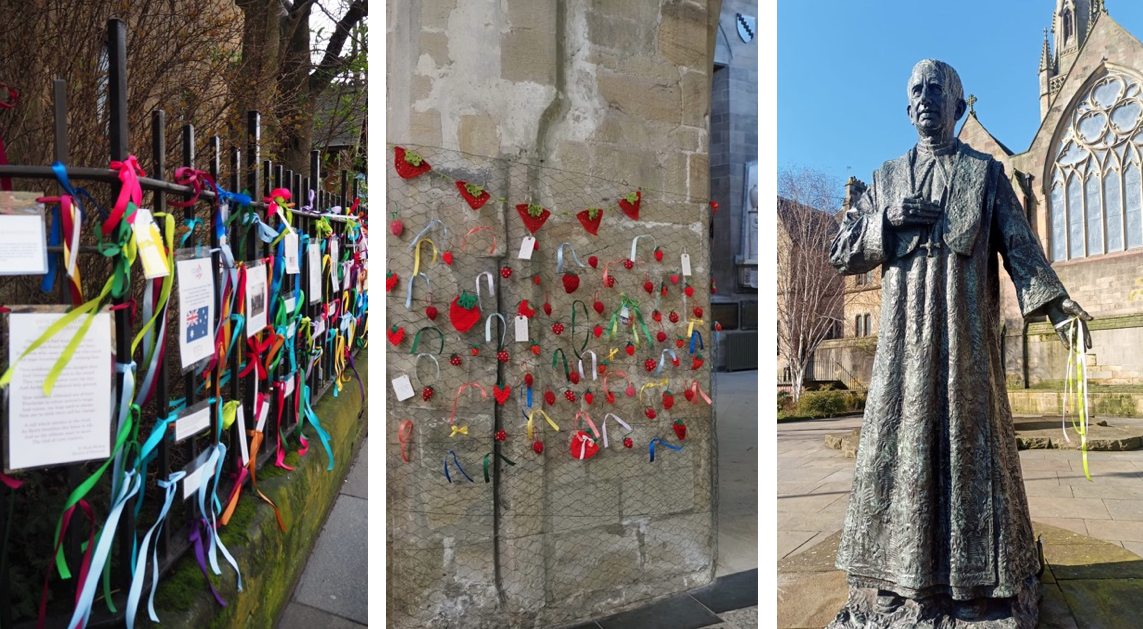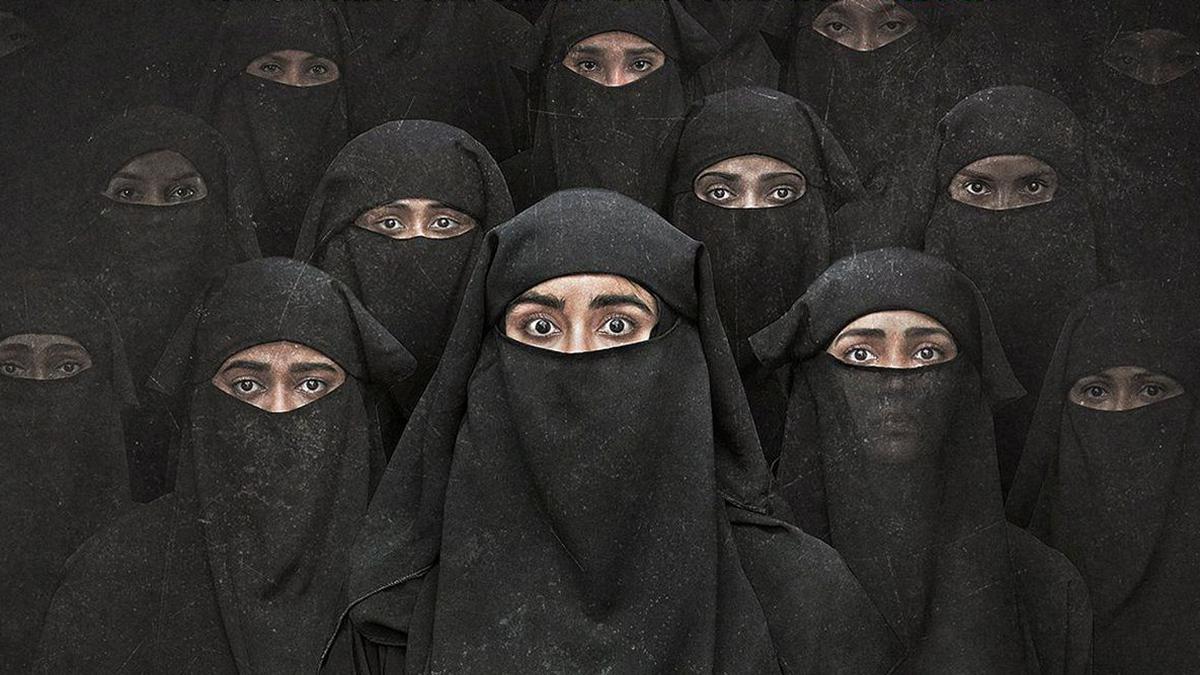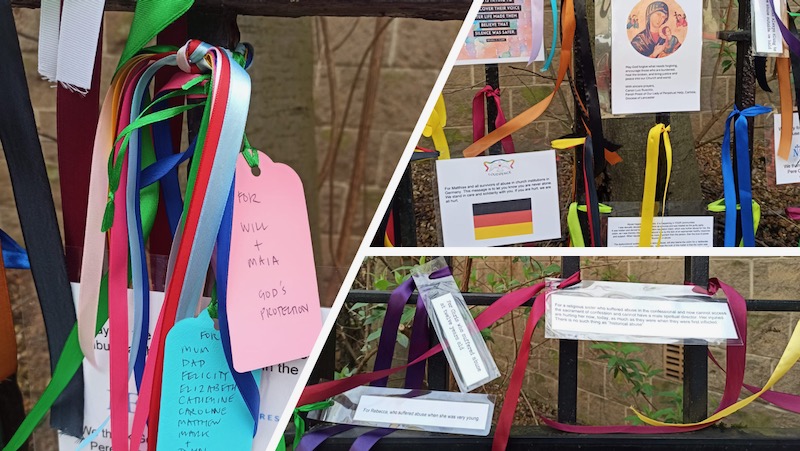Walk in Each Other’s Shoes – LOUDfence Newcastle
A kitchen table in Cumbria might seem like an unlikely place to start a movement, but we know there is sound precedent for surprises from the peripheries. We need only remember Philip’s rejoinder to Nathanael’s dismissal of Nazareth, “Come and see.” (John 1:46)
LOUDfence UK originated in the village of Kirkbampton as a response to a local child sexual abuse crisis in the Anglican church. It was a simple act of solidarity deployed by Antonia Sobocki, a Catholic survivor, to support her neighbour and to give everyone in the church, survivors and survivor-allies, a voice. This first LOUDfence event, and those that have followed, pivot around tying ribbons of all colours and styles to railings, suspended wires, around trees, and as internal displays within churches. In these liminal settings, the ribbons symbolically enable people to send and receive messages of care, compassion, and support. In giving visibility and voice to the eviscerating effects of CSA, LOUDfence fosters honesty and truth telling, seeking to break cultures of silence, taboo, and containment.
From these humble beginnings in October 2021, there have been more than 20 LOUDfences across Britain, mostly ecumenical, involving Catholic and Anglican parishes, and often over multiple days. These diocesan-wide events have brought together local survivor groups and CSA safeguarding teams, working with bishops and priests, men and women religious, and hundreds of concerned people within, but especially estranged from or outside, the churches, to grieve, to remember, and to recognise abuse in our communities. Last September Antonia was invited to the Vatican to address the Pontifical Commission for the Protection of Minors, where she also met Pope Francis. In that personal audience the Pope offered his prayers and blessings to LOUDfence, alongside expressing a hope that her ministry would spread to other places.
Following LOUDfences in the diocese of Northampton, Plymouth, Southwark, Birmingham, Cardiff, as well as Paris, Lourdes, Rome and Orleans – events were held from 3-6 March in the Dioceses of Hexham and Newcastle and Liverpool (9 March). From our different positionalities, as a survivor-poet (Patricia) and a historian-‘vernacular theologian’ (Alana), we ‘came and saw’, experienced, and were profoundly transformed.

Patricia
I arrived early in the morning to my second LOUDfence, held at Newcastle’s St Mary’s Catholic Cathedral. As my numb fingers tied ribbons and messages onto the fence, a woman approached me. I took her inside to make her own tags. Nearing the end of ribbon-tying, I realised that she hadn’t returned. I went into the vestibule and found her, still by the tags, crying. I passed her a tissue, and stood in silence as she wrote name after name. When she was finished, together we went back outside to the fence. I encouraged her to read others’ messages in the hope she would not feel alone. I saw her begin to loop her ribbons around the fence, and then I had to turn away, crying too.
I cried at my first LOUDfence as well, in St David’s Cathedral, Cardiff in October 2023. I was there at Antonia’s behest, and did not know what to expect. I certainly did not expect to cry. Nor did I expect my pain as a CSA survivor to be recognised – or that this recognition would move me so deeply. Yet all of this happened. My own father – my abuser – had died without accepting responsibility for his actions, or acknowledging the damage he had inflicted upon me and others. In Cardiff however I heard a public apology. I witnessed in Archbishop Mark O’Toole such humility, such sorrow for my and others’ pain, that I began to believe there may be some hope of reparation – both within and beyond the Church.
I am a writer – a poet and memoirist – as well as a tutor in creative writing at Cambridge. Soon after the Cardiff LOUDfence, Antonia urged me to make a poem around LOUDfence’s symbol of empty shoes for the Newcastle event. I usually resist writing to “commission” (not thinking myself to be very good at it!) but to my surprise this poem came relatively easily. Bishop Stephen Wright then invited me to read it during mass. When I stood at the lectern, a sea of two hundred faces looked back. And I knew that we were all there for a reason, whether as victim survivors, survivor-allies, witnesses, or activists: we were there to listen to each other, to express grief and compassion for each other, and to find a way forward. We were there to walk in each other’s shoes.
Alana
I have lived in the UK for 20 years, but my Catholic formation was in Australia where an MDiv undertaken alongside Jesuits, female Anglican priests, and Uniting Church ministers enabled me to rethread, as though through the eye of a needle. my familial religion and my feminism. My academic career as a historian of Catholicism has encompassed the study of Vatican II, the Humanae Vitae encyclical, pilgrimage routes and devotional cultures. I have only recently, and with great reluctance, turned my scholarly attention to CSA. I have a ten-year-old son, a heightened sense of empathy born of other childhood traumas, and I still wonder if I am emotionally robust enough to cope with the pain, grief and horrific acts of cruelty disclosed in hearing and accompanying victim-survivors.
The birth of LOUDfence in Ballarat out of the ashes of the 2015 Australian Royal Commission hearings, in the diocese where George Pell first came to his priesthood, is something I have watched with awe and admiration from afar. When the LOUDfence concept moved to the northern hemisphere, I knew I must lend my shoulder to the wheel.
The experience in Newcastle has undone me. Both cathedrals’ iron fences “shouting to heaven for justice” in colour and symbols, from formal well wishes from Fr Hans Zollner SJ through to one-sentence memoria for named individuals. I seek to process the event through fragments of images: empty shoes – like the “pregnant absence” of the mercy seat on the arc of the covenant? – in front of the altar and tabernacle. A handcrafted “field of strawberries” displayed in St Nicholas’ Anglican cathedral, dialoguing with its ribbon fence outside, knitted by parishioners to testify that sometimes something beautiful can unexpectantly grow out of “muck”. The statue of Basil Hume OSB alongside the Pugin-designed edifice with pink and green ribbons tied to his open hand.
It has been a week of searing and soaring emotions, profoundly grace-filled and hopeful, as well as humbling and emotionally numbing. I will need time to reflect on all I have been gifted – as a woman of stumbling faith and a scholar of religion. But it has also made me ask, is this what real, grassroots, DIY-synodality looks like? In the ribbons and memory objects, the hand fashioned ex votos, and messages bearing witness, might we encounter God’s ruah and find the “ears of the heart” within the broken body of Christ?
I am beginning to believe that this is the sort of “listening in the spirit” – embodied, sensory, affective, and relational– a synodal church desperately needs.
Our Shoes
for LOUDfence
I was 11 when my father started in
my mother, three years old
by her father too
I told her when I was 21
she told me the next year
from the psych ward
there was nothing
either of us could do
for each other
really
both damaged
all of
our childhood shoes
abandoned
by the side of every road
we travelled
***
now
going through my mother’s things
I find
baby shoes –
hers, or mine –
impossible to tell
white polish
peeled to grey leather
white laces
stiff with age –
she must have carried them
everywhere
for decades:
a reminder
of precious innocence
perhaps
or of what is possible
on a good day
these shoes
so small
I hold them
in my palm
***
now
look closely
look at the children we were
look at the women and men we have become
now
in my mother’s name
and mine
I ask
and pray
for no more
empty shoes
one day
© Patricia Debney 2024
Patricia Debney’s next book, “Leaving Locust Avenue”, is a memoir about being a survivor of CSA. https://patriciadebney.com/; Alana Harris works at King’s College London. More information about LOUDfence UK is available at: https://loudfence.com/. The next LOUDfence will be held in the Diocese of Wheeling-Charleston, West Virginia USA. If you have been affected by any of the issues raised by this article, information and support is available from https://thesurvivorstrust.org/. Photos courtesy of LOUDfence UK



 Loading ...
Loading ...
What do you think?
You can post as a subscriber user ...
User comments (0)